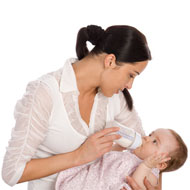- General Articles
- General Pregnancy Questions
- Baby Growth
- Pregnancy Diet
- Miscarriage
- During Pregnancy
- Twin Pregnancy
- Toddler Meals
- Home Remedies During Pregnancy
- Breastfeeding
- Pregnancy Week By Week
- Pregnancy Tests
- Ectopic Pregnancy
- Pregnancy Signs and Symptoms
- Pregnancy Stages
- Potty Training
- Fetal Development
- Preschooler
- Postpartum Depression
- Toddler Illness
- Baby Care
- After Pregnancy
- Molar Pregnancy
- During Delivery
- Beauty and Style
- Pregnancy Clothing
- Preconception
- Fertility
Pregnancy Complications After 35
There are several women who start their families when there are in the mid 30s, or even later. Around 1 in 5 women who are pregnant in the Unites States is over the age of 35. Most of them go on to having healthy babies. This causes people to wonder if indeed there are any pregnancy complications after 35. Studies indicate that women who are over the age of 35, may experience some pregnancy complications and risks, mainly because if their age. One of the biggest problems is that as women enter their thirties, there is a decline in their fertility caused by factors...
. like a fall in the number of eggs that can be ovulated as well as their health, an altered ovulation pattern because of hormonal changes and the presence of certain medical conditions like hypertension, endometriosis, etct Although advanced medical healthcare can help older women who are pregnant, the complications involved for this age group are higher than younger womene
One of the biggest risks that old women face is the chance of giving birth to a child with a birth defect, which is caused by the abnormal division of the eggg Moreover the percentage of babies with Down Syndrome is much higher in children whose mothers got pregnant after the age of 353 Another serious pregnancy complication in older women is the risk of a miscarriageg Statistics show that about 15% of pregnant women in their 20s may suffer from the risk of miscarriagese However, this increases to 25% for older womene Older women are also more likely to have cesarean deliveries, as compared to younger womene
However, by taking some preventive measures, you can deal with the complications and reduce the risksk Given below are some tips to help women who are over 35:
- Maintain a healthy diet, which includes a lot of fresh fruits and vegetablese It is very important for women to get the required amount of vitamins and minerals especially folic acidsd Therefore, women suffering from any deficiencies can choose to take a supplementn
- Drink a lot of water each day, which includes at least 8 to 12 glassese This keeps you well hydrated and reduces the possibility of dehydration, which can be caused by excessive morning sicknesss
- Exercising can be quite beneficial, but you first need to check with your doctor about the different types of exercises that are acceptable for youo
- Limit the intake caffeine in your diete Drinks like coffee, black tea and sodas should be avoided completelyl Chocolate contains some amount of caffeine too and should be avoidede
- Make sure that you do not smoke and stay away from people who smoke too, as passive smoking is just as injurious to the health of the unborn babyb
Read more articles from the During Pregnancy Category.



 7 Must-Haves Before Your Baby Arrives
7 Must-Haves Before Your Baby Arrives Bonding Games for Babies
Bonding Games for Babies DIY Baby Bath Towel Apron
DIY Baby Bath Towel Apron Common Late Pregnancy Fears
Common Late Pregnancy Fears